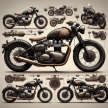The History and Evolution of Triumph Bobber Motorcycles
Triumph Bobber Motorcycles

Intro
Triumph Bobber Motorcycles, the epitome of British engineering and a symbol of motorcycling freedom, have travelled a long journey from their creation to the present day. This article will delve into the depths of Triumph Bobber’s rich history and chronicle its evolution over the years.
Triumph Motorcycles: The Origins and Early Years
Let's step back in time and see how Triumph Motorcycles all began. Way back in the 1900s, Triumph made its debut on the scene, soon becoming a leading light in the motorcycle industry. It all started with Siegfried Bettmann in 1886, when he set up a small import-export business dealing with everything from bicycles to sewing machines.
However, Bettmann soon discovered his true passion - motorcycles. The very first Triumph motorcycle was a nifty piece of kit. Picture this - a sturdy bicycle frame equipped with a dependable 2.2hp Minerva engine. As simple as it sounds, it was a game-changer, a testament to Triumph's knack for innovation.
The company didn't just stop there. Oh no, they were just getting started. They went on to design and produce motorcycles that won over bikers across the globe, earning themselves a reputation for top-notch, reliable machines. Little did they know, they were laying the groundwork for the Triumph Bobber and countless other legendary bikes yet to come.
So there you have it - a sneak peek into the early years of Triumph Motorcycles. From a humble import-export venture to pioneering the motorcycle industry, it's been one heck of a ride. And it's this innovative and ambitious spirit that gave us the Triumph Bobber, but that's a story for another time.
The Birth and Original Appeal of the Triumph Bobber
Circling back to the era just after World War II, a novel breed of motorbike enthusiasts emerged on the scene in the UK, with a keen interest in customising their standard Triumph rides. The result? The iconic 'Bobber'. You see, the transformation involved stripping the motorcycle down to its essentials, getting rid of any superfluous bits and bobs, tuning up the engine for a serious speed boost, and most importantly, 'bobbing' or trimming the rear fender down to size.
The Triumph Bobber's appeal lay in its representation of an unfettered spirit and rebellious streak. Picture it as a direct reaction to the prim and proper bikes from yesteryears. This maverick of a machine, with its minimalistic design and impressive power, had heads turning and tongues wagging in the motorcycling circles, and before you know it, Triumph was no longer just a British manufacturer. It became a worldwide symbol of cool. This, my friends, is how the Triumph Bobber muscled its way into the motorcycle scene, and man, what an entrance it made!
Triumph Bobber: Defining A New Era of Motorcycling
When the Triumph Bobber first graced the streets, it did more than just rev its engine – it roared out a whole new chapter in motorbike history. This wasn't just any old bike; the Bobber broke away from the status quo with its bare-bones aesthetic and penchant for power.
Picture the scene: At a time when most motorcycles were all about being flashy and ornate, the Bobber stood out like a rebel with a cause. This beast focused on pure performance and a back-to-basics style, essentially flipping a V-sign to the traditional, slow-paced motorcycles of yesteryear.
What's more, this rebellious spirit struck a chord with riders across the globe, sparking a trend in motorbike design that was more about freedom, grit, and speed. Not just a motorcycle, but a movement,
About the Creator
Muhammad Raheel Asghar
Raheel's journey as a storyteller mirrors the evolution of the British motorcycle industry itself—marked by triumphs, challenges, and an enduring spirit. His narratives not only explore the technical marvels that have defined eras.






Comments (1)
Interesting